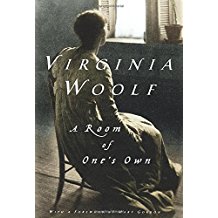
 Woolf notes that writers didn’t mention what state of mind they were in when they wrote their works of genius, at least not until the arrival of “nineteenth century self-consciousness.” We know what Carlyle, Flaubert, and Keats went through when writing their masterworks. “And one gathers from this enormous modern literature of confession and self-analysis that to write a work of genius is almost always a feat of prodigious difficulty. Everything is against the likelihood that it will come from the writer’s mind whole and entire. Generally material circumstances are against it. Dogs will bark; people will interrupt; money must be made; health will break down …. But for women, I thought,..these difficulties were infinitely more formidable. In the first place, to have a room of her own…was out of the question…. Since her pin money, which depended on the good will of her father, was only enough to keep her clothed, she was debarred from such alleviations as came even to Keats or Tennyson or Carlyle, all poor men, from a walking tour, a little journey to France. … The indifference of the world which Keats and Flaubert and other men of genius have found so hard to bear was in her case not indifference but hostility.”
Woolf notes that writers didn’t mention what state of mind they were in when they wrote their works of genius, at least not until the arrival of “nineteenth century self-consciousness.” We know what Carlyle, Flaubert, and Keats went through when writing their masterworks. “And one gathers from this enormous modern literature of confession and self-analysis that to write a work of genius is almost always a feat of prodigious difficulty. Everything is against the likelihood that it will come from the writer’s mind whole and entire. Generally material circumstances are against it. Dogs will bark; people will interrupt; money must be made; health will break down …. But for women, I thought,..these difficulties were infinitely more formidable. In the first place, to have a room of her own…was out of the question…. Since her pin money, which depended on the good will of her father, was only enough to keep her clothed, she was debarred from such alleviations as came even to Keats or Tennyson or Carlyle, all poor men, from a walking tour, a little journey to France. … The indifference of the world which Keats and Flaubert and other men of genius have found so hard to bear was in her case not indifference but hostility.”